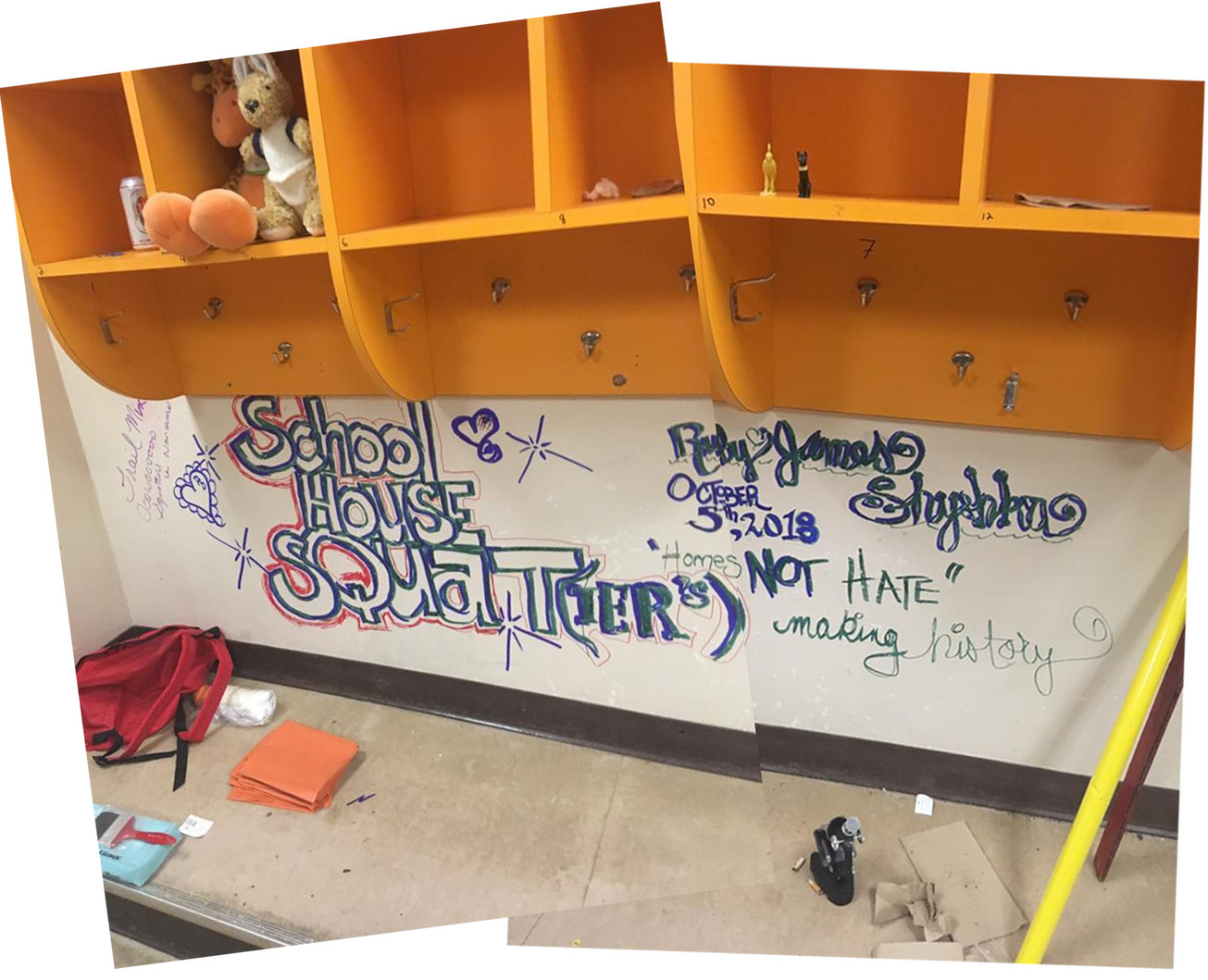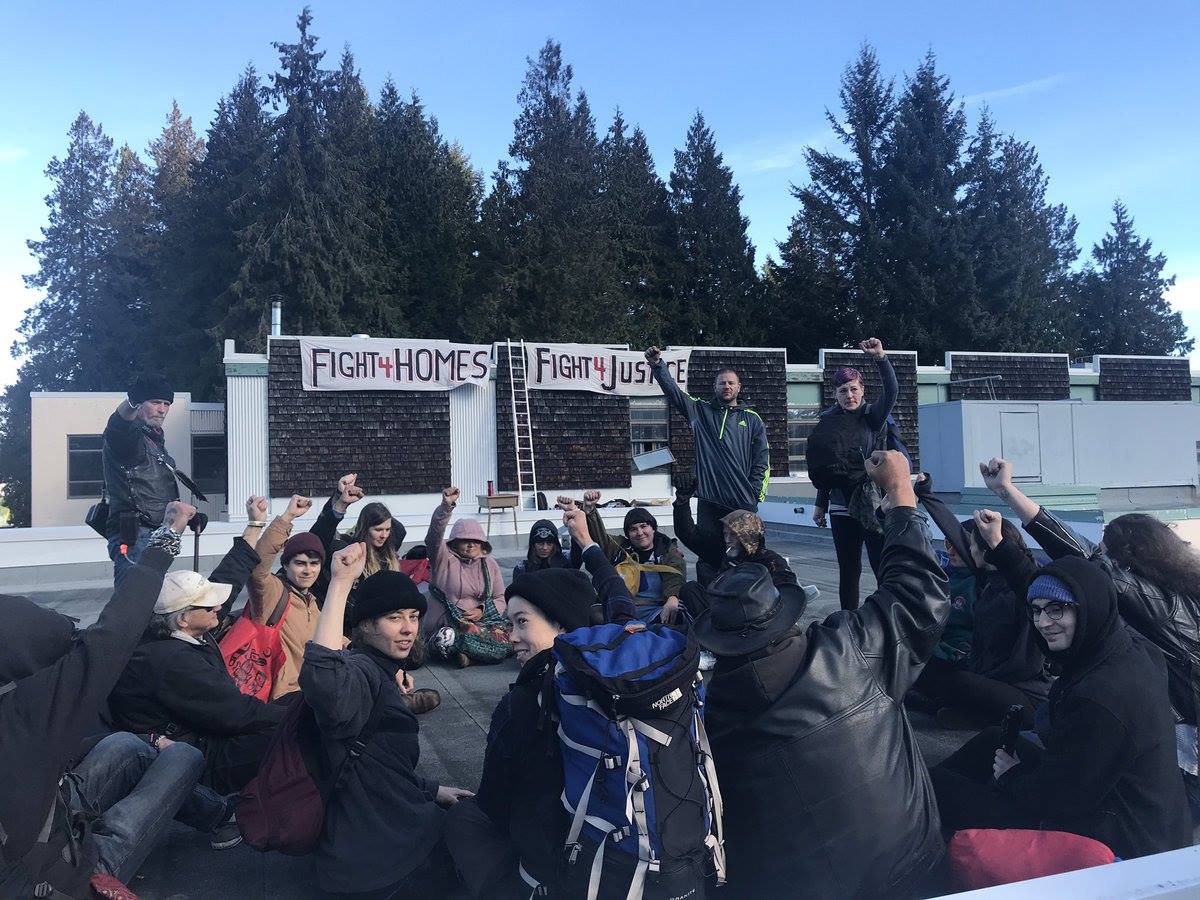
On October 5th, a group of homeless people, supporters, and members of Alliance Against Displacement took over an abandoned school and started the Schoolhouse Squat. Cops immediately taped off the entire school grounds as a crime scene, preventing media and supporters from entering. Simultaneously, a crowd of bigots, later led by a local chapter of the white supremacist Soldiers of Odin, gathered to yell racist, misogynistic, poor-bashing slurs and threats at the squatters, who were congregated on the roof.
At one point, Dwayne, an Anita Place Tent City resident and council member, yelled back, “You idiots, we’re fighting for you!” His claim has two bases. The first signals the reality that the visible homeless, like Dwayne, are just the tip of the iceberg of the housing crisis: in addition to this population, which bears the brunt of anti-homeless hatred, there are the “hidden homeless”: people who are couchsurfing or living out of their cars, as well as people who are currently housed but are just a pay cheque or two away from homelessness. Like Dwayne often says, “If you’re living 3 people in a 1 bedroom apartment, you’re homeless.”
The second, deeper basis of Dwayne’s point is that in a political landscape dominated by right wing austerity politics, emergent fascism, and leftist inclinations toward inoffensive reforms, homeless people are making revolutionary interventions into the rule of capitalist and colonial property that build working class and Indigenous power. Unsurprisingly, broad portions of the public denounced the Schoolhouse Squat, rallying to defend the rotten heart that beats at the core of both capitalism and colonialism: property. The pushback against the occupation of an unused building reveals the depth to which Canadians, both on the left and the right, are committed to defending colonial property forms, even against their best, long-term interests. By interrupting and exposing the dispossessing and exploitative foundations of our society, homeless leaders are paving the way for a mass movement against capitalism and colonialism.
“We are the truth”: The need for revolutionary interventions to end the housing crisis

Working class people who hate on homeless people are, in Dwayne’s words, “living in a dream world.” Rather than confront their own material precarity, they lash out at homeless people, pathologizing them and grasping for an explanation of the housing crisis that relies on racism, misogyny, and xenophobia, and blames individuals for failing to overcome homelessness. In doing so, they poleaxe social mores that hold outright violence at bay and clear the path for the increasingly repressive actions of the state. Their mob support not only applauds police terror, but makes it possible. The mass agitation of anti-homeless bigots, who demand cop violence, block housing projects from breaking ground in their neighborhoods, and commit vigilante attacks against homeless people, work together with the state to attack the power of organized working class and Indigenous people.
Time and time again we witness how the police and the anti-homeless mob act as a relay together. At the Schoolhouse Squat, a handful of supporters rallied outside the gates alongside bigots. When one of the bigots headbutted a supporter, the cops made the supporters leave, accusing them of inciting violence. When Soldiers of Odin members yelled “faggot,” and tried to tear a “HOMES NOT HATE” sign from the hands of a youth who bravely marched to the front of the mob to hold it up, cops pushed the youth away from the crowd. When a Soldiers of Odin member followed him and kneed him in the crouch, the cops led away both the SOO member and the youth. From the pigs’ perspective, supporters of militant actions for housing justice are always the inciters, even when they’re the ones being assaulted. In an interview on Victoria’s CFAX radio, the RCMP’s public liaison Gary O’Brien justified the police’s swift repression of activists by claiming that the “public” (read: a white nationalist-led mob) “said, we’re not tolerating this, that they wanted the RCMP to intervene and we did.”
“Get a job!” Running afoul of the gendered productivity scripts of Canadian society
The anti-homeless bigot’s endless refrain of “get a job” fits into a working class tendency to cope with the exploitative nature of wage labour by valorizing it. At a jail support press conference, an Alliance Against Displacement member reminded anti-homeless bigots that if it weren’t for activists, we wouldn’t have an 8 hour workday. One of the bigots proudly and angrily retorted, “I work 15 hours a day.” But the “get a job” line isn’t actually about work—many homeless people do have jobs—so much as a symbolic line that people draw between themselves and the homeless working class.
Dwayne explains, “Where I come from if you can’t feed your kids, you’re not a man.” For working class people who are confronting their own economic precarity in the midst of capitalist crises, the pressures they experience are deeply gendered. Rather than see how their interests are bound up with the struggles of homeless people, some opt to attack homeless people for violating gender norms: for failing to be men who can “feed their kids”, or for failing to be women who live entirely within the confines of private domesticity.
The ideological power of the gendered and racialized norms that fascism cherishes masks the contradiction that for working class people, valorizing these norms and attacking those who fail to live up to them only entrenches capitalist exploitation. When housed working class people scapegoat homeless people, they are mistaking the appearance of crises for the causes of crises, to their own ultimate detriment. In Dwayne’s words, “We are the truth. This is what it is. It’s not going to get any better. There’s just more misery—people think it’s going to get better without any change. Things stay the same when you keep doing the same things.”
While portions of the working class invest in their own downfall by adopting fascist ideas, homeless activists are committing to militant self defense. They see how anti-homeless hatred is legislated by the state, both through the hard force of police repression and the soft force of social workers and institutional housing, and they see how colonial and capitalist property forms prevent them from making use of abandoned resources to save their own lives. Dwayne explains that the desperation many homeless people experience also provides a clarity about the way the world actually is: not how crises appear, but where they come from. “We have nothing to lose. Our backs are against the wall. Everything has been taken from us, the government has fucked us over,” he says. “We’re a good example of coming back and creating power after losing it. Most people don’t have the fortitude to come back from something like this. They should be proud rather than trying to keep us down and make excuses for it.”
Property divisions break working class unity
The truth that organized homeless people embody is that the crisis is indeed a crisis, and can only be addressed through radical upheavals that target the foundations of the settler-colonial state: not a political revolution, but a social one. Homeless people are fighting the fight we need to strike at the heart of the housing crisis, which is just one manifestation of a broader capitalist crisis; first, by occupying empty lots—land parceled out as municipal or provincial property—in order to collectively survive, and now, by taking that fight into empty buildings. Dwayne says, “We fight, knowing we’re not going to be appreciated, but hated. We’re doing what’s needed and what’s right”. As squatters return to their homeless communities with bonds forged in the fires of struggle, they are sharing the story of pig repression and angry mobs, as well as the story of experiencing firsthand how the best of tent cities—community, safety, cooperation, and coordination—becomes even better under a roof, with electricity and running water. Seeing an abandoned school as a potential shelter requires imagination, because capitalism and settler colonialism demand that there is nothing is more sacred than property rights, not even human lives.
The harsh circumstances that homeless activists find themselves in is reflective of a historical problem that the working class in BC is deeply divided along lines of access to property. Working class people who own property, or who identify with the pursuit of property-ownership, are necessarily more invested in capitalism and settler colonialism—some of them identify so strongly with the settler-colonial nation state that they are adopting fascist ideas that rest on the violent exclusion of anyone who does not fit the propertied and private, white-coded, straight, cis nuclear family model upon which the Canadian state is founded. Appealing to the rationality of this group to think otherwise, even if they are contributing to their own alienation and exploitation, is unlikely to be successful, given the deeply-set ideological powers that normalize settler-colonialism and capitalism in Canada, which some people gravitate toward to anchor themselves in times of economic turmoil. From their perspective, homeless people’s militancy, in threatening the capitalist and colonial rule of property, are attacks against them.
“We’re doing what’s needed and what’s right”: The struggle moves forward

While the unpropertied working class might recognize, intuitively or explicitly, the material necessity of homeless militancy, their own ability to take radical action is hemmed in by the room they still have to maneuver within the margins of the capitalist and colonial system, as well as responsibilities and pressures that amplify the risks of extralegal action. Low-income tenants who are living in the rapidly-gentrifying Metrotown neighborhood of Burnaby, for example, might voice support for a We Won’t Go campaign that would refuse mass eviction orders, but are unlikely to refuse to leave their own units after being evicted unless they feel like they have no other options. They know they are being pushed, but their backs are not yet against the wall.
Homeless radicals, on the other hand, are leading interventions that forge new political possibilities, the most exciting of which is that of a parallel working class and Indigenous struggle to occupy land and empty buildings on the basis of land relations, not property rights. Such a struggle necessarily happens outside the confines of the capitalist and colonial legal system, and would materially benefit both Indigenous people, particularly urban Indigenous people who are dispossessed of their territories, as well as working-class people. The property form that suppresses Indigenous economies by parcelling territory into property mandates that in order for Indigenous people to be recognized as “persons” in the eyes of the Canadian legal and economic system, their relations to land and nation must be erased or violently repressed. And the same property form sees working class people exclusively as either a source of profit that must be exploited or a threat to profits that must be disposed of.
The homeless activists who spearheaded the Schoolhouse Squat exposed the contradictions of a system that values empty, abandoned buildings over the lives of working class and Indigenous people. The severe backlash they received, both from the state and from bigots, working class or otherwise, demonstrates how much is at stake—the very foundations of the Canadian state and the liberation of all.









